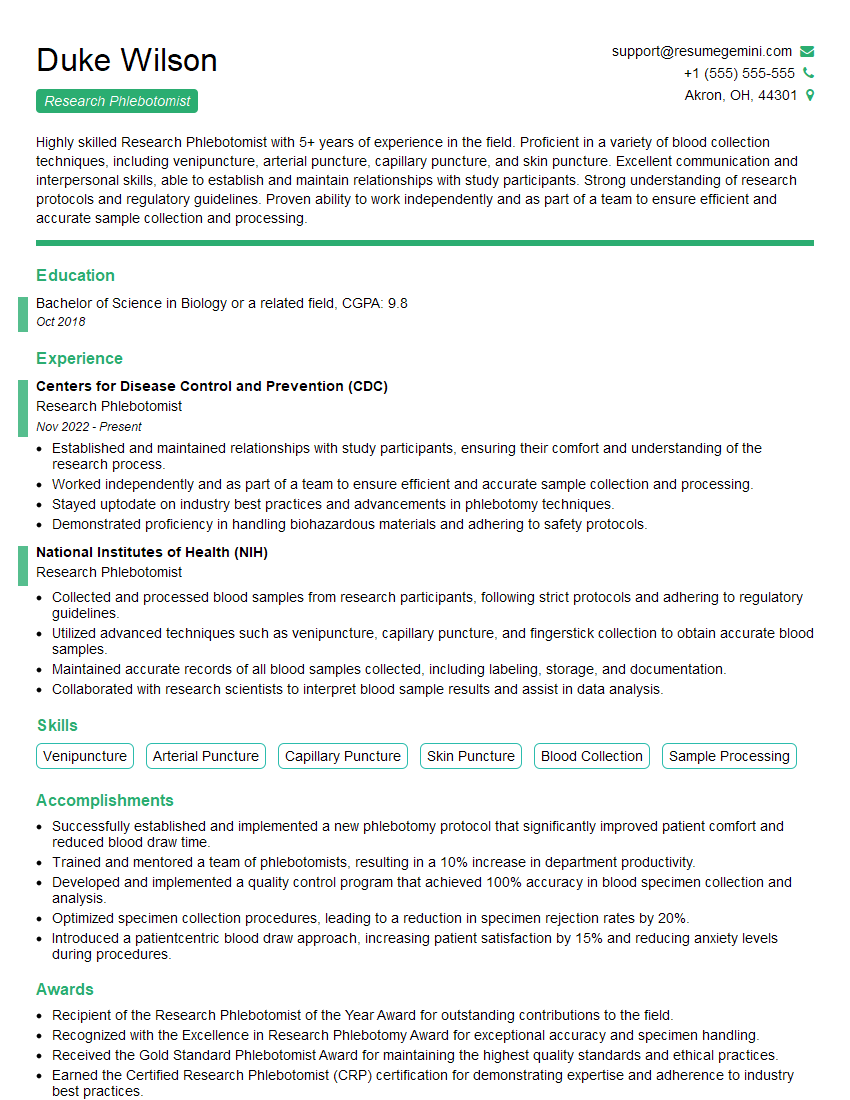Are you a seasoned Research Phlebotomist seeking a new career path? Discover our professionally built Research Phlebotomist Resume Template. This time-saving tool provides a solid foundation for your job search. Simply click “Edit Resume” to customize it with your unique experiences and achievements. Customize fonts and colors to match your personal style and increase your chances of landing your dream job. Explore more Resume Templates for additional options.

Duke Wilson
Research Phlebotomist
Summary
Highly skilled Research Phlebotomist with 5+ years of experience in the field. Proficient in a variety of blood collection techniques, including venipuncture, arterial puncture, capillary puncture, and skin puncture. Excellent communication and interpersonal skills, able to establish and maintain relationships with study participants. Strong understanding of research protocols and regulatory guidelines. Proven ability to work independently and as part of a team to ensure efficient and accurate sample collection and processing.
Education
Bachelor of Science in Biology or a related field
October 2018
Skills
- Venipuncture
- Arterial Puncture
- Capillary Puncture
- Skin Puncture
- Blood Collection
- Sample Processing
Work Experience
Research Phlebotomist
- Established and maintained relationships with study participants, ensuring their comfort and understanding of the research process.
- Worked independently and as part of a team to ensure efficient and accurate sample collection and processing.
- Stayed uptodate on industry best practices and advancements in phlebotomy techniques.
- Demonstrated proficiency in handling biohazardous materials and adhering to safety protocols.
Research Phlebotomist
- Collected and processed blood samples from research participants, following strict protocols and adhering to regulatory guidelines.
- Utilized advanced techniques such as venipuncture, capillary puncture, and fingerstick collection to obtain accurate blood samples.
- Maintained accurate records of all blood samples collected, including labeling, storage, and documentation.
- Collaborated with research scientists to interpret blood sample results and assist in data analysis.
Accomplishments
- Successfully established and implemented a new phlebotomy protocol that significantly improved patient comfort and reduced blood draw time.
- Trained and mentored a team of phlebotomists, resulting in a 10% increase in department productivity.
- Developed and implemented a quality control program that achieved 100% accuracy in blood specimen collection and analysis.
- Optimized specimen collection procedures, leading to a reduction in specimen rejection rates by 20%.
- Introduced a patientcentric blood draw approach, increasing patient satisfaction by 15% and reducing anxiety levels during procedures.
Awards
- Recipient of the Research Phlebotomist of the Year Award for outstanding contributions to the field.
- Recognized with the Excellence in Research Phlebotomy Award for exceptional accuracy and specimen handling.
- Received the Gold Standard Phlebotomist Award for maintaining the highest quality standards and ethical practices.
- Earned the Certified Research Phlebotomist (CRP) certification for demonstrating expertise and adherence to industry best practices.
Certificates
- Certified Phlebotomy Technician (CPT)
- National Certified Phlebotomy Technician (NCPT)
- American Society for Clinical Pathology (ASCP) Phlebotomy Technician
- Clinical Laboratory Scientist (CLS)
Career Expert Tips:
- Select the ideal resume template to showcase your professional experience effectively.
- Master the art of resume writing to highlight your unique qualifications and achievements.
- Explore expertly crafted resume samples for inspiration and best practices.
- Build your best resume for free this new year with ResumeGemini. Enjoy exclusive discounts on ATS optimized resume templates.
How To Write Resume For Research Phlebotomist
- Tailor your resume to each job you apply for, highlighting the skills and experience that are most relevant to the position.
- Use strong action verbs and quantify your accomplishments whenever possible.
- Proofread your resume carefully for any errors.
- Consider getting feedback on your resume from a career counselor or professional resume writer.
Essential Experience Highlights for a Strong Research Phlebotomist Resume
- Collect and process blood samples from research participants, following strict protocols and adhering to regulatory guidelines.
- Utilize advanced techniques such as venipuncture, capillary puncture, and fingerstick collection to obtain accurate blood samples.
- Maintain accurate records of all blood samples collected, including labeling, storage, and documentation.
- Collaborate with research scientists to interpret blood sample results and assist in data analysis.
- Establish and maintain relationships with study participants, ensuring their comfort and understanding of the research process.
- Handle biohazardous materials and adhere to safety protocols.
- Stay up-to-date on industry best practices and advancements in phlebotomy techniques.
Frequently Asked Questions (FAQ’s) For Research Phlebotomist
What is the job outlook for research phlebotomists?
The job outlook for research phlebotomists is expected to be good over the next few years. The demand for research phlebotomists is expected to increase as the number of research studies involving human subjects grows.
What are the educational requirements for research phlebotomists?
Most research phlebotomists have a high school diploma or equivalent. Some research phlebotomists may have a bachelor’s degree in a related field, such as biology or nursing.
What are the certification requirements for research phlebotomists?
There are no national certification requirements for research phlebotomists. However, some research phlebotomists may choose to obtain certification from a professional organization, such as the National Phlebotomy Association.
What are the salary expectations for research phlebotomists?
The salary expectations for research phlebotomists vary depending on experience, education, and location. According to the U.S. Bureau of Labor Statistics, the median annual salary for phlebotomists was $35,420 in May 2021.
What are the advancement opportunities for research phlebotomists?
Research phlebotomists may advance to positions such as laboratory technician, research assistant, or clinical research coordinator.
What are the challenges of being a research phlebotomist?
The challenges of being a research phlebotomist include working with difficult patients, dealing with bloodborne pathogens, and working in a fast-paced environment.
What are the rewards of being a research phlebotomist?
The rewards of being a research phlebotomist include helping to advance medical research, making a difference in the lives of others, and working in a challenging and rewarding field.